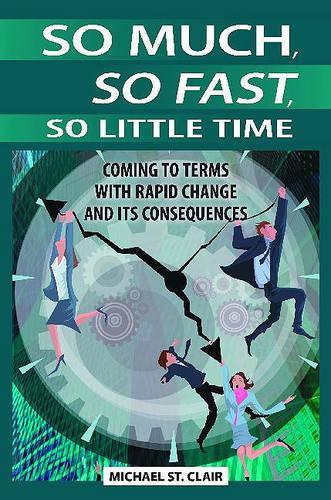
So Much, So Fast, So Little Time: Coming to Terms with Rapid Change and Its Consequences
(Hardback)
Publishing Details
So Much, So Fast, So Little Time: Coming to Terms with Rapid Change and Its Consequences
By (Author) Michael St. Clair
Bloomsbury Publishing PLC
Praeger Publishers Inc
9th August 2011
United States
Classifications
General
Non Fiction
Social and ethical issues
303.4
Winner of 2012 Outstanding Academic Title 2013
Physical Properties
Hardback
248
Width 156mm, Height 235mm
567g
Description
This book examines the extraordinary changes that technology brings and how these affect all of us and our familiesat home, at school, and at our work placeswith profound consequences for society. Twenty-first-century technology opens up fabulous opportunities, but also changes how we relate to each other and warps our sense of time, reality, duty, and privacy. Technologies and time-saving devices make everything happen faster, with the result that we feel busier than ever before. "Free time" seems in danger of extinction. So Much, So Fast, So Little Time: Coming to Terms with Rapid Change and Its Consequences provides fascinating insights about how our changing world is changing our families and our personal relationships; how we travel, behave as consumers, and communicate; and how we entertain ourselves and deal with our anxieties. Written in a popular, accessible style, this book describes seven areas of significant societal change, providing concrete examples and engaging stories to illustrate how drastically our right-now mindset has shifted our perception and experience of the world. In the last chapter, the author makes some practical suggestions on how to take thoughtful action to respond to the onslaught of inevitable change.
Reviews
Quite inspiring as a map of the multidimensionality of contemporary social change. * PsycCRITIQUES *
St. Clair addresses monumentally important issues. This reader is confident that anyone over the age of 30 has wondered about the very matters this book raises. But St. Clair does not just wonder; he explores the issues of rapid technological changes and their impact on 'us' individually and collectively. The thought-provoking introduction establishes seven important areas in which research on the consequences of rapid change could be organized: information and the Internet; communication, entertainment, and stimulation; work and how work changes individuals; social behavior and values; speed and altered time; family and personal relationships; and contradictory social trends and fewer shared experiences. In all these areas, rapid changeespecially rapid technological changeis changing forever who we are, what we do, what we value, and how we approach each other as a society. This is a must-read, including for parents and teachers who need to understand the 'Google generation' and 'digital natives' sitting in their classrooms and/or living rooms. Summing up: Essential. All readers. * Choice *
Author Bio
Michael St. Clair, PhD, is emeritus professor of psychology at Emmanuel College, Boston, MA.
